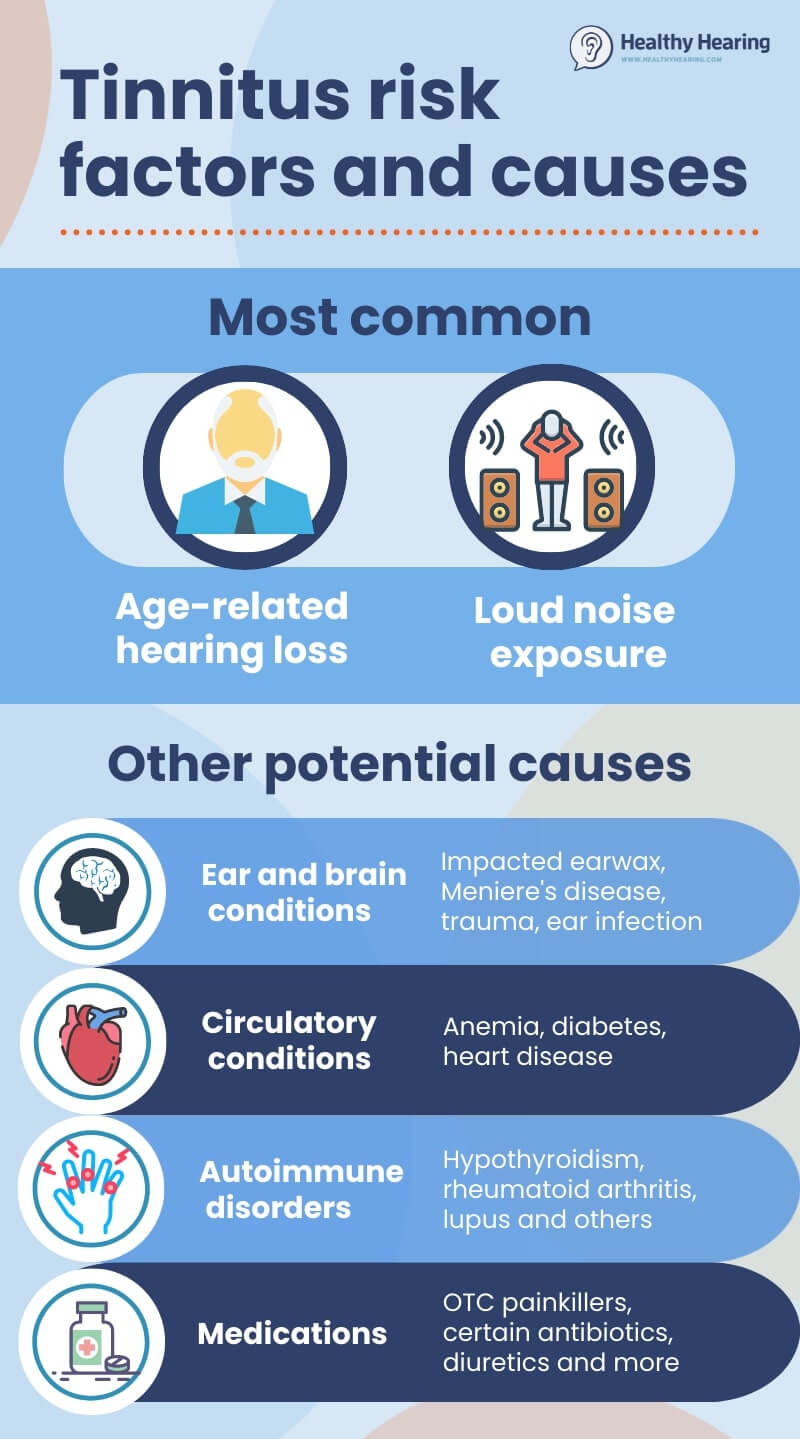Tinnitus is a complex condition with many potential causes and risk factors. Tinnitus can also occur for no apparent reason in otherwise healthy people.
For example, even though years of loud noise exposure is a risk factor, not all people exposed to loud noise develop tinnitus. However, there is a strong link between hearing loss and tinnitus.
What causes tinnitus?
Hearing loss & noise damage are big factors
The exact cause is unknown, but most experts think nerve damage from noise exposure is the main reason. The current theory is that damage or dysfunction occurs along the nerve pathways that detect sound waves and deliver sound to your brain. This leads to disrupted hearing and sound processing, including tinnitus.
There are many different places in the inner ear and auditory nerve where such damage could occur, meaning tinnitus is likely not just one disease—with one simple treatment. A person often has multiple risk factors and medical conditions, making it hard to know if there's a single culprit.
If you have a history of loud noise exposure, you are at high risk of tinnitus.

Medical causes of tinnitus
If you have tinnitus, start your treatment path by seeking out a hearing healthcare professional who specializes in tinnitus diagnostics so they can help identify the underlying cause.
Common medical causes
Anemia, allergies, impacted earwax, diabetes, and hypothyroidism are all associated with tinnitus and sometimes hearing loss.
If these common causes for tinnitus are ruled out, the practitioner will refer you to another specialist for further evaluation and treatment.
Disorders of the ear
Otosclerosis, third mobile window syndrome, and Meniere's disease can cause tinnitus. If your hearing care practitioner suspects you have a condition originating in the ear, they may refer you to an otolaryngologist, or ear, nose and throat (ENT) physician.
Head injuries and brain diseases
A head injury, such as whiplash or concussion, can cause damage to the delicate inner ear structures, which may lead to tinnitus. Neurologic diseases like multiple sclerosis can result in tinnitus, and acoustic tumors on the auditory or vestibular nerve can create tinnitus by pressing on the neural connections. In this case, a neurologist would be the primary physician to help you.
Heart and blood vessel problems
If your tinnitus resembles a pumping, beating or pulsating sound, it could be caused by damage to your blood vessels. This is known as pulsatile tinnitus. Some common underlying cardiac causes of tinnitus include high blood pressure, turbulent blood flow, heart disease, and malformations of the small arteries. Seek prompt medical care if you hear pulsing sounds.
Medications that cause tinnitus
The most common drugs known to cause tinnitus are non-steroidal anti-inflammatory drugs (like aspirin and other OTC pain relievers), diuretics, certain antibiotics and cancer drugs, and the malaria drug quinine. But many others can cause tinnitus, too, including high blood pressure drugs. If you experience tinnitus after starting any new medication, or changing a dosage, discuss it right away with your pharmacist or physician to determine if you should stop, reduce, or change the medications you are currently taking.
Did you know? One of the most common drugs known to cause tinnitus is aspirin, especially when taken in high doses.
Risk factors for tinnitus
Aging, loud noise exposure, and certain habits are all strongly linked to tinnitus. However, you can still develop tinnitus even if you have none of these risk factors.
Age-related hearing loss
Hearing loss due to aging is called presbycusis, and it often starts around the age of 60. This gradual loss of hearing as the inner ear deteriorates can cause tinnitus. The worse the hearing loss, the more likely you are to have tinnitus, too: "Those with a hearing impairment have a higher risk for tinnitus, and the associated increase in risk is dependent on the severity of hearing impairment," state the authors of a large survey of U.S. adults.
Loud noise exposure
Being exposed to loud noise on a regular basis from heavy equipment, chain saws, or firearms are common causes of hearing loss and tinnitus. This is a big problem among both active military members and veterans, who experience tinnitus more often than the general public. Noise-induced hearing loss and tinnitus also can be caused by listening to loud music through headphones or attending loud concerts frequently. It is possible to experience short-term tinnitus after seeing a concert, but long-term exposure will cause permanent damage.
Lifestyle habits
Researchers are not entirely certain why, but drinking alcohol excessively, smoking cigarettes, eating certain foods and consuming caffeinated beverages can play a role in tinnitus. Frequently being fatigued or stressed can also be a factor. So can being sick. In short, if you're not taking good care of your overall health, you are more susceptible to tinnitus.
Find tinnitus treatment
If you are experiencing tinnitus symptoms (such as ringing in your ears), visit our directory of hearing health care professionals to find a clinic that tests for tinnitus near you. Please note that not all hearing clinics treat tinnitus, so you may need to browse several clinic pages to find the right provider.
Joy Victory, managing editor, Healthy Hearing
 Joy Victory has extensive experience editing consumer health information. Her training in particular has focused on how to best communicate evidence-based medical guidelines and clinical trial results to the public. She strives to make health content accurate, accessible and engaging to the public.
Read more about Joy.
Joy Victory has extensive experience editing consumer health information. Her training in particular has focused on how to best communicate evidence-based medical guidelines and clinical trial results to the public. She strives to make health content accurate, accessible and engaging to the public.
Read more about Joy.
 Reviewed by
Megan Gerhart, audiologist
Reviewed by
Megan Gerhart, audiologist  Reviewed by
Megan Gerhart, audiologist
Reviewed by
Megan Gerhart, audiologist 



 Joy Victory has extensive experience editing consumer health information. Her training in particular has focused on how to best communicate evidence-based medical guidelines and clinical trial results to the public. She strives to make health content accurate, accessible and engaging to the public.
Joy Victory has extensive experience editing consumer health information. Her training in particular has focused on how to best communicate evidence-based medical guidelines and clinical trial results to the public. She strives to make health content accurate, accessible and engaging to the public.
